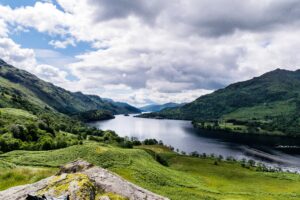Report finds Scotland’s lochs and reservoirs rapidly heating
The climate crisis has already caused rapid and extensive heating of Scotland’s lochs and reservoirs, according to the Centre of Expertise for Waters (CREW).
Researchers found that between 2015 and 2019, 97% of monitored Scottish lochs and reservoirs have increased in temperature.
Over this period most warmed up by up to 1 degree per year, but 9% increased even more, with some increasing by 1.3 degrees per year.
Scientists behind the study warned that this kind of heating increases the risk of algal blooms developing which can produce toxins harmful to humans and wildlife.
If these blooms are allowed to grow it could mean lochs and reservoirs could no longer be used for recreation or as a water supply.
Researchers also predict waters in the south and east of Scotland will warm the most initially, while all parts of the country will be affected by 2040.

Scotland’s Environment Minister, Mairi McAllan, said: ‘This important research provides yet more worrying evidence of the risks of harm from climate change on Scotland’s water environment. It is vital that we do more to mitigate those impacts, to seek to reduce the pace of warming but also to adapt to it. We have committed £243 million since 2015 through the Agri-Environment Climate Scheme to support land management practices which protect and enhance Scotland’s natural heritage, improve water quality, manage flood risk and mitigate and adapt to climate change.
‘Scotland is renowned worldwide for the quality of our water. Research like this will be hugely valuable in informing the development of policy solutions and measures to mitigate and adapt to climate change, and also protect, restore and enhance these vital natural assets.’
The report made a number of recommendations, including reducing the amount of phosphorus and nitrogen, the main drivers of algal blooms, from entering lochs and reservoirs.
It was suggested buffer strips and constructed wetlands could help in doing this.
NatureScot Freshwater and Wetlands Advice Manager, Iain Sime, said: ‘Scotland, like the rest of the world, is facing an unprecedented climate emergency. The findings of this comprehensive review are stark, demonstrating the impact that climate change is already having on our freshwater lochs and reservoirs, and their biodiversity.
‘The need for urgent action is clear, and at NatureScot we are using the £65m Nature Restoration Fund to prioritise efforts that support the conservation of our lochs and ponds.’
Photo by Gary Ellis












